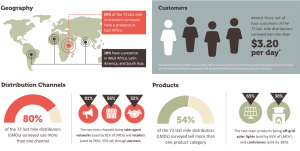Embrace LMDs as enablers of sustainable development
- LMDs represent a key opportunity to achieve the Sustainable Development Goals.
- By distributing beneficial products to low-income and hard-to reach customers they not only play a critical role in enabling human potential and wellbeing, but also in providing job opportunities in retail and sales at the last mile.
- By generating demand and helping consumers build a credit history, LMDs also help create markets, enabling other companies to step in and sustainably serve last mile consumers.
Recognise that there is no one-size-fits all approach
- Three broad groups emerge among LMDs surveyed: (1) Fast growth companies for whom sales revenue is the main source of income; most of which show sales per full time sales agent of over 10,000 USD/year and who have already raised equity; (2) Smaller, stable companies that have more varied income sources, including consumer research for companies or training for governments; and (3) Young experimenting LMDs, whose business model and growth strategy are yet to be determined.
- This diversity requires financial, technical and capacity-building interventions to be tailored appropriately.
Tackle LMDs’ top challenges to help them thrive
- Despite their differences, LMDs cite similar barriers. Enabling LMDs to prosper means addressing challenges they face in procurement, sales efficiency and access to finance.
- This can be done in a range of ways including through centralised purchasing and improving product certification, enhancing sales management platforms and training services.
- Access to finance can be improved by adapting existing funding mechanisms and establishing specialist funds that are able to make smaller investments, accept a higher level of risk and provide both technical and financial support.
Key recommendations
Aid agencies and foundations can play a vital role in providing flexible grants and rewarding commpanies for going the ‘extra lastmile’ that more commercial players do not serve, as well as in de-risking commercial investment in the sector.
Investors are encouraged to build the data and experience needed to invest in LMDs either directly, or through specialist intermediaries. Particular efforts must be made to overcome the barriers that local LMDs face when raising funds, particularly debt, to capitalise on their exceptional local market knowledge and networks.
LMDs need more opportunities to learn from and collaborate with each other, to unlock economies of scale (eg. in developing joint training materials or odering shared containers of products) and implement best practices.
Manufacturers should ramp up efforts to design and test products in consultation with LMDs and their customers, and to build long-term strategic partnerships with them.
Service providers such as software and training companies could both help the sector and tap into a new market by developing low-cost, tailored platforms and services that LMDs need to thrive.
Governments must recognise the role of LMDs in contributing to development goals, and ensure they are included in dialogue between the public and private sectors.






